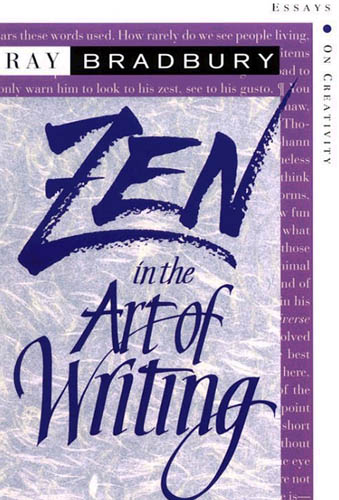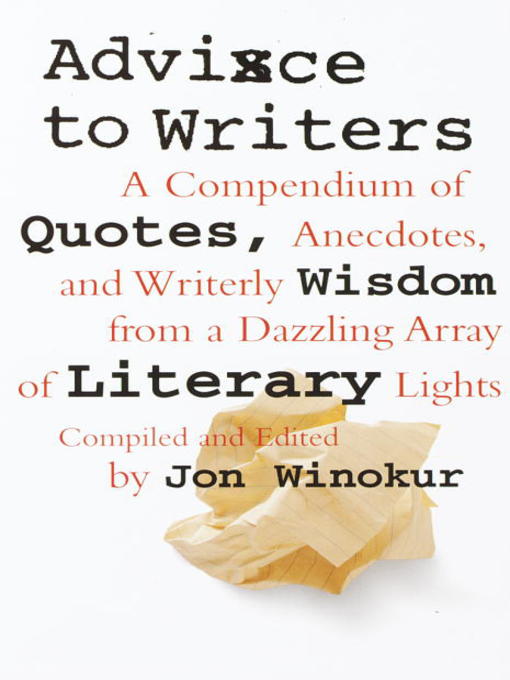I don't know about you, but I went through a phase where I bought tons of books about writing always thinking that in just the next one, I'd find the hint, the spark that would catapult me and my manuscript onto the best seller lists.
It was a very enjoyable past time until it dawned on me that I just didn't have a best seller sort of personality or, for that matter, a best selling talent. Never even managed to finish any manuscript I ever started.
But in the meantime, I learned plenty from other people's opinions and ideas about what constituted good and bad writing. I'd even appropriated a rule or two. So it wasn't a total waste of my time. (Whether I put any of it into practise is questionable - but there's always learning for learning's sake.) I still enjoy reading this sort of thing.
So if you're ever in the mood to read about the craft of writing, here are five books which I found enlightening for various reasons:
(You'll notice that I've left off ELEMENTS OF STYLE by William Strunk Jr. and E.B. White. I'm assuming that anyone who's ever been remotely interested in writing already has a copy of this classic on a shelf somewhere.)
5 Favorite Books About Writing
1) ON WRITING by Stephen King
This is more of a combo - two for the price of one. You get King's autobiography mixed in with his views on writing and most particularly how it all began for him. It's really an incredible story and even though I'm not King's biggest fan, I found myself agreeing with a lot of what he says about the writing life. The man is, undoubtedly, a genius.
Even if you've never read a King story and have no plans to do so (though I truly recommend his latest, 11/22/63), I say: read his book on writing. It is fascinating.
2) ZEN IN THE ART OF WRITING by Ray Bradbury
A Bradbury rule that has always made a lot of sense to me:
Read poetry every day of your life. Poetry is good because it flexes muscles you don't use often enough. Poetry expands the senses and keeps them in prime condition. It keeps you aware of your nose, your eye, your ear, your tongue, your hand. And, above all, poetry is compacted metaphor or simile. Such metaphors, like Japanese paper flowers, may expand outward into gigantic shapes. Ideas lie everywhere through the poetry books, yet how rarely have I heard short story teachers recommending them for browsing.
What I like most about this book is that Bradbury's love of writing comes shining through. His zest and zeal are catching. He apparently takes a great deal of joy in what he does.
3) GOOD ADVICE ON WRITING Great Quotations from Writers Past and Present on How To Write Well by William Safire and Leonard Safir
Great quotes in this one. Most of them make a hell of a lot of sense. Some of them might even inspire someone to write. It's always very interesting to me to learn what writers consider good advice.
I've always loved this bit of foreshadowing sense from Anton Chekhov:
If, in the first chapter you say there is a gun hanging on the wall, you should make quite sure that it is going to be used further on in the story.
Also this from Elmore Leonard:
My most important piece of advice to all you would-be writers: when you write, try to leave out all the parts readers skip.
4) TELLING LIES FOR FUN AND PROFIT A Manual For Fiction Writers by Lawrence Block
A real nitty-gritty, nuts and bolts how-to with loads of practical writing tips. Lawrence Block is a perennial best selling crime fiction writer and as such, knows his craft inside and out.
A very entertaining yet practical look at the art and craft of writing well. There are tons of quotes, some informative and even dazzling, some not so much. Make what you will of this one:
I know everything. One has to, to write decently.
Henry James







Like the King and Block one. I have read so many over the years and many have a least one good point to make but these two have more and I like the blunt style they both use.
ReplyDeletePatti: Yes, the King book especially is exceptional. But these are all good, I think.
ReplyDeleteI'm very fond of quotes from writers. Many of them boggle the mind. :)
Interesting collection, Yvette - but you're right; I have lived by the rules of Strunk and White since my high school days (I think my copy was carved into cave walls), and the rules in that slim book remain, in my opinion, the best "how-to" guidelines for good writing.
ReplyDeleteI don't think I could ever write, have tons of stories. I like non fiction. Not too much a fan of horror stories, like King. He is a wonderful person. He has helped the town of Bangor a lot.
ReplyDeleteHere comes the snow storm, I have to cancel my appointment. won't drive in this.
Love your posts.
yvonne
Les: It's definitely a keeper. I've had my copy for ages.
ReplyDeleteBut I like looking through these other books as well. They're mighty entertaining if nothing else. Especially the ones with quotes.
Thanks, Yvonne. You're getting snow? Nothing down here. It must have skipped us. Oh well, batten down the hatches and snuggle in with nice hot cups of tea and a cookie or two or three. :)
ReplyDeleteStay warm.
Yvette, it's a funny thing: I've read excerpts of each of these books from magazines and such, yet for one reason or another, I've never been able to give each entire book my undivided attention! But I've gleaned something from each of those books and found something valuable in each excerpt, so that counts for something, right? :-) Thanks for sharing your reviews of all of these, my friend!
ReplyDeleteIn truth, Dorian, these are the sorts of books (except for the Stephen King) which don't mind being read in bits and pieces. As you say, you can still glean something valuable from each one.
ReplyDeleteI'm mad about literary how-to quotations from writers.
Is the Elmore Leonard quote from his TEN RULES OF WRITING? I read it quite recently. It was an easy read too. If you read too many of them, books on writing begin to read like fiction!
ReplyDelete